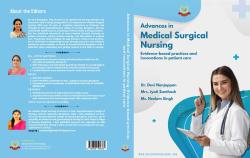INNOVATIONS IN SURGICAL PROCEDURES AND POST OPERATIVE CARE
Abstract
Surgical procedures have evolved significantly, driven by technological advancements and a deeper understanding of human physiology. Minimally invasive surgeries, such as laparoscopy and robotic-assisted surgery, have revolutionized the way we approach complex conditions, offering smaller incisions, reduced pain, and quicker recovery times. These innovations not only improve surgical precision but also it enhances patient safety by minimizing complications. Recent years have witnessed groundbreaking advancements in surgical procedures and post-operative care, significantly improving patient outcomes, recovery times, and overall healthcare efficiency. Innovations such as minimally invasive surgery, robotic-assisted techniques, and personalized post-operative care strategies have revolutionized the medical field. The integration of artificial intelligence (AI), 3D printing, and enhanced imaging technologies has further refined precision and patient safety. Additionally, advancements in pain management, infection control, and rehabilitation protocols have contributed to improved recovery experiences. This chapter explores the latest innovations in surgical methodologies, perioperative care, and post-operative management, highlighting their impact on modern medicine. Post-operative care has seen remarkable improvements, with personalized approaches focusing on faster recovery and better outcomes. Advances in pain management, such as targeted nerve blocks and non-opioid analgesics, helps to reduce the reliance on traditional pain killers, minimizing the risk of addiction. Enhanced recovery protocols (ERAS) promote early mobilization, nutrition, and psychological support, fostering a holistic recovery experience. Additionally, the integration of artificial intelligence (AI) and data analytics in both surgery and post-operative care is enhancing decision-making and optimizing care plans tailored to individual patients. Virtual reality (VR) is also playing a role in pre-surgical preparation and rehabilitation, helping patients better understand procedures and manage their recovery journey.









